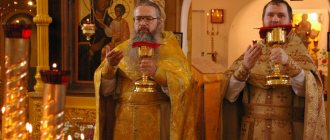In none of his letters does the Apostle Paul call on Christians to fast. The apostles Peter and John also say nothing about this. This (fasting of Christians specifically) is not mentioned in any book of the New Testament.
And yet, Christians have been fasting for two thousand years. One of the expressions of a healthy Christian church was fasting. No matter how outdated fasting may seem today, fasting as a request for Christ's grace has been practiced for two millennia.
Why do Christians, although they are not commanded like Muslims, still fast? First, Jesus' teaching throughout the gospels, particularly Matthew, is quite clear. Setting the example personally (Matt. 4:2), although not directly calling for fasting, Jesus gives instructions about fasting itself: “When you fast” (not “if,” Matt. 6:16-17). Moreover, speaking of the time when His followers will be abandoned by Him, He says: “Then they will fast (Matthew 9:15, Mark 2:20, Luke 5:35). And these words are not just a rule, but a commandment from the lips of our Savior, which is at least unreasonable to ignore.
Why is fasting needed?
Fasting is abstinence. Fasting can take different forms: fasting for many days (for example, Lent or Christmas, which last longer than a month); one-day (Wednesday and Friday of most weeks, when the Orthodox also try to fast) or post-preparatory (for example, three days before Communion).
All fasts are united by one goal and exist only for the sake of it: to limit a person in the physical in order to help him in the spiritual. In other words, fasting is not a goal (to eat less, watch less movies), but to help a person focus on his inner life. This is why fasting is needed.
Prayer, contemplation of inner silence, attempts to find this silence: the more distractions around, the more difficult it is for a person to come into contact with this spiritual world.
Definition of fasting according to the Orthodox dictionary
Photo: Flickr.com
Fasting is a voluntary activity for the glory of God, of an ascetic nature, which consists of:
- abstinence from nourishing and pleasant food, lack of entertainment and amusements;
- thorough examination of the soul and cleansing from sinful thoughts;
- independent compulsion to prayer, reading spiritual literature, thinking about spiritual subjects and good deeds.
The goal and intended outcome of each fast is significant spiritual growth.
Is it possible not to fast and still be a good person?
Orthodoxy does not say that the main goal of life is to be a good person. Good human qualities are a given, and to be a good person you don’t have to be a Christian.
The true and deepest goal of a person is to acquire the Grace of the Holy Spirit, find peace in the Holy Spirit, unite in soul and spirit with Christ, and affirm in oneself the Love of Christ, which is higher than any human love - even maternal or marital.
Fasting in Christianity is an assistant in achieving this Good goal. Fasting is days (or weeks) during which a person consciously makes a decision: according to his strength and capabilities, to escape from the life of the body. Take a break from the life of the busy world and place your mind in thoughts about God - in order to focus on the spiritual. Because the earthly nature of man, unfortunately, is this: without external restrictions, we do not know how to fully focus on spiritual life. Even the saints couldn't!
This is why this post is needed...
How to fast correctly?
On the one hand, everything is simple. Fasting correctly means observing all the norms established by the Orthodox Church. For example, if we talk about food, then Lent means a ban on any dairy, fish or meat products. And during the Nativity Fast you can fish.
Or if we talk about entertainment, it means that a person tries during Lent - or at least on its strictest days (for example, on Holy Week before Easter) - not to go to entertainment events: cinema, parties, holidays.
On the other hand, priests often say that while remembering and honoring external attitudes, one must not forget about the essence of fasting: cultivating within oneself an Eternal person who lives by Spirit and Love. And from this point of view, fasting correctly does not always mean observing all norms literally, but limiting yourself to the best of your ability - in those habits in which the body really takes power over a person.
(There is a well-known parable about the publican and the Pharisee. The Pharisee was a great ascetic and faster, he kept all the rules, but he was proud and boasted about it, and therefore the value of his fast was “zero”)
Fasting is about cultivating Love within yourself.
A well-known saying in Christianity: “It is better to eat meat during Lent than to eat loved ones.” This is a reminder that there is no point in external fasting if at the same time a person continues to be embittered towards those with whom he lives under the same roof and does not act with Love towards them.
Therefore, sometimes priests bless families for an “unusual” form of fasting: when, seeing difficulties in the relationship between spouses, they are allowed to eat meat, and fasting for them is to never quarrel with each other, and in controversial situations to always give in. Because fasting like this is more correct than observing the letter, not eating fish and meat, while forgetting about the Spirit.
There are very heartfelt words about the essence and spirit of fasting in the book of the prophet Isaiah:
“This is the fast that I have chosen: loose the chains of unrighteousness, untie the bands of the yoke, and set the oppressed free, and break every yoke; divide your bread with the hungry, and bring the wandering poor into your home; When you see a naked person, clothe him, and do not hide from your half-blood. Then your light will open like the dawn, and your healing will quickly increase, and your righteousness will go before you, and the glory of the Lord will follow you […] When you remove the yoke from among you, you will stop lifting up your finger and speaking offensively, and you will give your soul to the hungry yours and feed the soul of the sufferer, then your light will rise in the darkness and your darkness will be like noon.”
Internal: expression of repentance.
The first and simplest, yet quite important thing that fasting expresses is repentance. Let’s call it “internal”, directed towards ourselves. Believers understand that they have sinned - by doing something insignificant, namely by remaining in a state of rebellion against God for a long time - and they come to him for forgiveness.
For example, in 1 Samuel chapter seven, God's people become aware of their past and present idolatry (and God's hand in their discipline). They decide to come to God and anew “turn their hearts to the Lord and serve only Him.” Led by Samuel, they gather together and, fasting as a sign of repentance, admit that they have “sinned against the Lord.” Likewise, in 1 Kings 21, Ahab, although “having sold himself to do evil in the sight of the Lord,” humbled himself by fasting when Elijah rebuked him, and the Lord was pleased to postpone the impending punishment even for such an evil king. In Nehemiah chapter 9 we see God's people gathered together to fast in rags, confessing and asking God for forgiveness. In the book of Daniel in chapter 9, the prophet sees that the period of exile has come to an end and says: “I turned my face to the Lord God, seeking Him and praying for mercy with fasting in rags and ashes.” He prayed to God and confessed the sin of the people to Him in the hope of restoration. And in the same way, Joel (the first and second chapters of the book of Joel) calls for fasting for the sake of repentance and turning to God from one’s sins - as was the case in Nineveh, when people believed Jonah, although he did not want their salvation. They called everyone together for fasting and dressed in torn clothes, from young to old (book of Jonah, chapter 3).
The Old Testament saints often expressed inner repentance to God not only in words, but by witnessing to him through fasting. Such a post was not an attempt to earn forgiveness, but to indicate the extent of their regret.
External: empathy for circumstances.
Fasting expresses not only repentance. Often he is the voice of sorrow, bitterness and crying in the midst of difficulties. How the 1st book of Samuel ends and the 2nd begins is the death of Saul and the grief of the people. Book 1 ends with a seven-day fast of lamentation. The 2nd begins with the news of Saul's death reaching David, and he and his people wept and fasted until evening for Saul and his son Jonathan, for the people of God, for the house of Israel, because he had fallen by the sword. This fast was not a mourning for one’s own sin, but for the death of the king.
When Haman's new decree comes out (Book of Esther, chapter 4), the Jews mourned, fasted and wept, and many of them sat in sackcloth and ashes. When David speaks in prayer about the betrayal of his friend, he says that they rejoice over his grief, although he humbled himself by fasting and grieved when they were weak (Psalm 34). Psalm 68 says that David wept and humbled his soul by fasting, not in repentance, but because he had been treated badly. And Ezra was also upset and fasted not because of his sin, but because he learned that the holy people had mixed with the nations of the earth (book of Ezra chapter 9).
Fasting becomes the voice of pain and grief in the midst of sudden and difficult external circumstances, representing a heart that trusts in God despite grief.
The Future: In Search of God's Will.
Finally, we move from internal repentance and external empathy to initiative and ask God for guidance or blessings. The first mention of fasting in the Bible (the end of the book of Judges) is of precisely this nature. God's people not only grieve over the impending war, but also ask Him whether they should go to war against the tribe of Benjamin. We encounter a similar question in the second book of Chronicles (chapter 20, verses 3, 12): “And Jehoshaphat feared, and turned his face to seek the Lord, and declared a fast throughout all Judea and said: ... Our God! You judge them. For we have no strength against this great multitude that has come against us, and we do not know what to do, but our eyes are directed to You!”
David sought salvation from God with the words: “My knees are weak from fasting, and my body has lost its fatness” (Psalm 109:24), asked for the health of his newborn, and later said: “As long as the child was alive, I fasted and wept, for I thought: who knows if the Lord will have mercy on me and the child will remain alive? (2 Samuel 12:22).
The practice of praying for God's protection "before the future" played a very important role in the preservation of Israel and their return from captivity. Before asking for mercy from an earthly king, Esther first turned to God (Esther 4:16):
“Go, gather together all the Jews who are in Susa, and fast for my sake, and do not eat or drink for three days, day or night, and I and my maidens will also fast and then I will go to the king, although this is against the law, and if I die, I will die.”
God answered Esther and made her an instrument of salvation for the entire people.
Even Darius, king over captive Israel in the final years of exile, fasted as he sought to save Daniel from the lions. Before leaving Babylon, Ezra declared a fast: “That we may humble ourselves before the face of our God, asking Him for a prosperous path for ourselves and for our children and for all our property...” (Book of Ezra, chapter 8). For Nehemiah, fasting was not only an expression of pain and grief, but also a search for God's blessing: “I pray to You, Lord! Let Your ear be attentive to the prayer of Your servant and to the prayer of Your servants who love to revere Your name. And prosper Thy servant now, and bring him into favor with this man” (Nehemiah chapter 1). He prayed and fasted, and then, by faith, he came to the king.
Believers often fast to strengthen their requests for God's guidance, protection on the journey, and special favors.
Should sick or pregnant women fast?
Fasting must be measured against your strength and health. For those who are sick, infirm, or just beginners, the priests allow them to soften their fast. For example, before Christmas, you do not strictly fast for all 40 days, but only on Wednesdays and Fridays. Because there is no point in fasting if it does not help a person connect with God, but only rocks him through life and spoils his health.
There is a known story when one of the strictest ascetics of the holy Mount Athos, Elder Joseph the Hesychast, even ordered his disciple Ephraim of Philotheus to eat a piece of meat a day - because he was in poor health, and there were already enough exploits in their life. And this is in a monastery: where they don’t eat meat even on “simple” days!
Brothers of Elder Joseph the Hesychast. Ephraim of Philotheia, who was blessed to eat meat, is second from left.
“Fasting is for man, not man for fasting.” Every person on earth has his own strengths, his own understanding, his own stages of the spiritual path. Therefore, for example, to the question: should pregnant women fast strictly? The answer is almost always “no”: pregnant women, of course, can and should make concessions. The mother herself knows what is needed for her health and the health of her fetus.
In any case, it is recommended to coordinate the severity of fasting with the priest. He will be an assistant and advisor on how best to prepare yourself for fasting, and how best to fast in your situation. How not to take on a feat that is beyond your strength, or vice versa - not to be led by your own weaknesses.
Why and why we should fast. Answers of the Optina elders
Peace be with you, dear visitors of the Orthodox island “Family and Faith”!
People who are far from the Church, as well as Christians who have little church membership, tirelessly ask the question: Why is it necessary to fast?
Simple answers do not suit them. They need detailed explanations. And in order for us to give the correct answers, we ourselves must know the deep importance of observing fasting days.
Olga Rozhneva has prepared an excellent selection of answers and instructions from the Optina elders about the importance and necessity of fasting, the impact of fasting on health, how to fast correctly, and the article also touches on other aspects of fasting life.
In monasteries, questions regarding fasting do not arise, but people living in the world are often perplexed: how to fast when colleagues or family members do not fast, when you need to work full time and have a long way to get to work, when you are overcome by illnesses and infirmities, fatigue and stress?
The Optina elders considered fasting very important and gave many instructions about fasting and abstinence.
Why do we fast
The Monk Ambrose wrote about the need to observe fasts:
“We can see about the need to observe fasts both in the Gospel and, firstly, from the example of the Lord Himself, who fasted for 40 days in the desert, although He was God and had no need for this. Secondly, to the question of His disciples why they could not cast out a demon from a person, the Lord answered: “Because of your unbelief,” and then added: “This generation cannot come out except through prayer and fasting” (Mk. 9:29).
In addition, there is an indication in the Gospel that we must fast on Wednesday and Friday. On Wednesday the Lord was handed over to be crucified, and on Friday he was crucified.”
The elder explained why we abstain from fasting food:
Venerable Ambrose of Optina
“Mean food is not defilement. It does not defile, but fattens the human body. And the holy Apostle Paul says: “Even if our outer man is decaying, yet our inner man is renewed from day to day” (2 Cor. 4:16). He called the outer man the body, and the inner man the soul.”
St. Barsanuphius reminded us that if we please the flesh, then its needs grow incredibly quickly and suppress any spiritual movement of the soul:
“The proverb is true: “The more you eat, the more you want.” If we just quench our hunger and thirst and get busy or begin to pray, food will not distract us from our activities. I experienced this myself.
If we please the flesh, then its needs grow incredibly quickly, so that they suppress any spiritual movement of the soul.”
Is fasting harmful to health?
Elder Ambrose instructed:
“Of course, it’s a different matter if someone breaks the fast due to illness and bodily infirmity. And those who are healthy from fasting are healthier and kinder, and what’s more, they live longer, even though they seem skinny in appearance. With fasting and abstinence, the flesh does not rebel so much, and sleep does not overcome so much, and fewer empty thoughts enter the head, and spiritual books are read more readily and understood more readily.”
The Monk Barsanuphius also explained to his children that fasting not only does not harm health, but, on the contrary, preserves it:
“But the commandments of the Lord are not grievous. The Orthodox Church is not our stepmother, but a kind and loving mother. She instructs us, for example, to observe moderate fasting, and it does not harm our health at all, but, on the contrary, preserves it.
And good doctors, even unbelievers, now claim that constantly eating meat is harmful: plant foods are necessary from time to time - that is, in other words, they prescribe fasting. Now in Moscow and other big cities vegetarian canteens are being opened to give the stomach a rest from meat. On the contrary, due to the constant consumption of meat food, all sorts of diseases occur.”
Should sick people fast?
There are cases of such bodily infirmities when fasting is not harmful, but, on the contrary, beneficial. Elder Barsanuphius gave an example from his pastoral practice, when a sick woman did not observe fasts, fearing deterioration in health and even death. But when she began to fast on the advice of the elder, she not only did not die, but completely recovered:
“Two spouses from a merchant family, leading a pious life, came to me. He is a healthy man, but his wife was constantly ill and never kept fasts. I tell her:
– Start fasting, and everything will pass.
She answers:
– What if I die from fasting? It’s scary to do such an experiment.
“You won’t die,” I answer, “but you will get better.”
And indeed, the Lord helped her. She began to observe the fasts established by the Church and is now completely healthy, as they say – “blood and milk.”
To the sick child who did not want to break his fast, Elder Ambrose answered:
“I received your letter. If your conscience does not agree to allow you to eat a modest meal during Lent, although due to illness, then you should not despise or force your conscience. Fast food cannot heal you from illness, and therefore later you will be embarrassed that you acted contrary to the good suggestions of your conscience. It is better to choose from lean foods that are nutritious and digestible for your stomach.
It happens that some sick people eat fasting food as medicine and then repent of this, that due to illness they violated the rules of the Holy Church about fasting. But everyone needs to look and act according to their conscience and consciousness and in accordance with the mood of their spirit, so as not to upset themselves even more by confusion and double-mindedness.”
However, illnesses and infirmities vary from person to person, and with some you can limit yourself, while with others it is better not to violate doctor’s orders. Not eating this or that food should not be an end in itself. Fasting is intended for healthy people, but for the sick, fasting is the disease itself. Pregnant women, sick people, and small children are usually exempt from fasting.
The Optina elders did not give general recommendations for all patients, but advised to act with reasoning, in accordance with the bodily strengths and characteristics of each person’s illness.
Thus, in connection with the upcoming fast, Elder Ambrose gave instructions to the mistress of the house, who was burdened with numerous chores with children and did not have good health:
“Try to spend the coming fast judiciously, taking into account your bodily strength. You must remember that you are the mistress of the house, surrounded by children; besides, ill health becomes attached to you.
All this shows that you need to be more concerned about spiritual virtues; Regarding the use of food and other bodily exploits, you should have good reasoning with humility in front of everything...
Saint Climacus quotes the words: “I did not fast, nor did I lie down, nor did I lie down on the ground; But I humbled myself, and the Lord saved me.” Humbly present your weakness to the Lord, and He is able to work all things out for good.”
The monk warned:
“Bodily weakness and pain are tricky, and it’s tricky to cope with it. Not without reason, Saint Isaac the Syrian, the first of the great fasters, wrote: “If we force a weak body beyond its strength, then confusion comes upon confusion.”
Therefore, in order not to be needlessly embarrassed, it is better to tolerate bodily weakness as much as necessary.”
Elder Anatoly (Zertsalov) wrote:
“You can eat fish if you are weak. Just please don’t be angry and don’t hold onto your thoughts for too long.”
What to do if you can’t get enough of lean food?
Some people complain that they don't get enough of lean foods. But actually it is not. A satiated belly demands more and more food, but it does not do any good. The Monk Joseph advised:
“You write that it’s scary to be left without milk. But the Lord is strong to give strength to a weak nature. It would be good to eat perches and ruffs..."
The elder himself ate very little food. Surprised by this, they once asked him whether it was difficult for him to achieve such abstinence or was it already given to him by nature? He answered with these words:
“If a person is not forced, even if he ate all the food of Egypt and drank all the water of the Nile, his belly will still say: I hunger!”
The Monk Ambrose used to say, as always, briefly but aptly:
“Explaining lips are a pork trough.”
How to combine fasting and social life (when you are invited to anniversaries, banquets, etc.)?
Reasoning is also required here. There are banquets and holidays where our presence is completely unnecessary, and we can safely refuse this celebration without breaking the fast. There are feasts where you can eat something lean, unnoticed by others, without exalting your fast over others.
In cases of breaking the fast “for the sake of guests,” St. Joseph taught:
“If you break abstinence for the sake of guests, then you don’t need to be embarrassed, but reproach yourself for it and bring repentance.”
The Monk Barsanuphius instructed:
“Fasting can be twofold: external and internal. The first is abstinence from modest food, the second is abstinence from all our senses, especially vision, from everything unclean and nasty. Both posts are inextricably linked with each other. Some people pay all their attention only to the external post, without understanding the internal one at all.
For example, such a person comes into society somewhere, conversations begin, in which very often there is condemnation of his neighbors. He takes an active part in them and steals a lot from his neighbor’s honor. But then it’s time for dinner. The guest is offered a quick meal: a cutlet, a piece of pig, etc. He resolutely refuses.
“Well, eat,” the owners persuade, “after all, it’s not what goes into the mouth that defiles a person, but what comes out of the mouth!”
“No, I’m strict about this,” he declares, completely unaware that by judging his neighbor, he has already broken and even completely destroyed the fast.”
Post on the road
There are other situations when we cannot fully fast, such as when traveling. When we travel, we live in special conditions beyond our control.
Although if the journey is short and there is an opportunity to eat lean food, then you should refrain from eating fast food.
In this regard, we can recall the instructions of Elder Barsanuphius:
“A young girl, Sofya Konstantinovna, who came to visit the Niluses in Optina Pustyn, complained to the elder in confession that, living in someone else’s house, she was deprived of the opportunity to observe fasts. “Well, why are you now tempted by sausage on your way on a fast day?” – the old man asked her. S.K. I was horrified: how could the elder know this?”
If the post seems unnecessary, redundant
Sometimes people deny the meaning of fasting, declare that they agree with all the commandments, but they don’t want to, cannot, and consider it unnecessary and superfluous. Elder Barsanuphius said in this regard that these are the enemy’s thoughts: the enemy sets this up because he hates fasting:
“We understand the power of fasting and its significance if only from the fact that it is somehow especially hated by the enemy. They come to me for advice and confession - I advise them to observe holy fasts. They agree with everything, but when it comes to fasting, I don’t want to, I can’t, and so on. The enemy is so exciting: he doesn’t want the holy fasts to be observed...”
About abstinence and three degrees of satiety
You also need to remember that you can become satiated with lean food to such an extent that it becomes gluttony. For people of different builds and having different physical activity, the amount of food will also be different. Reverend Nikon reminded:
“One pound of bread is enough for one person’s body, four pounds of bread is enough for another person’s body: he will not be satisfied with less bread. Therefore, Saint John Chrysostom says that a faster is not one who consumes a small amount of food, but one who consumes less food than what is required for his body. This is what abstinence is all about.”
The Monk Ambrose wrote about abstinence and the three degrees of satiety:
“You write about food that it is difficult for you to get used to eating little by little, so that after lunch you are still hungry. The Holy Fathers established three degrees regarding food: abstinence - in order to be somewhat hungry after eating, contentment - in order to be neither full nor hungry, and satiety - in order to eat to the full, not without some burden.
Of these three degrees, everyone can choose any one, according to their strengths and according to their structure, healthy and sick.”
If you break your fast due to inattention
It happens that a person eats fast food on a fast day due to inattention, absent-mindedness, or forgetfulness. How to deal with such an oversight?
The Monk Joseph gives an example of a man who ate a quick pie on a fast day, and at first he ate it, forgetting about the fast day, and then, remembering, finished it anyway, reasoning that he had sinned anyway:
“In your second letter, you described an incident that happened to you in St. Petersburg: you ate one half of a quick pie on Wednesday out of oblivion, and the other half you ate, having already come to your senses. The first sin is excusable, but the other is not excusable. It’s like someone running out of oblivion towards an abyss, but in the middle of the road he comes to his senses and still continues to run, despising the danger that threatens him.”
If you break your fast due to lack of willpower
Sometimes a person tries to keep the fast, but cannot stand it, due to lack of willpower, he breaks it and becomes despondent as a result. To these the Monk Joseph advised:
“When you cannot abstain, then at least let us humble ourselves and reproach ourselves and not condemn others.”
Also, Elder Joseph, in response to his child’s lamentation that he could not fast properly, answered:
“You write that you fasted poorly - well, thank the Lord for how He helped you abstain, and remember the words of St. John Climacus: “I did not fast, but humbled myself, and the Lord saved me!”
About immoderate, unreasonable fasting
The Monk Ambrose warned against unreasonable fasting, when a person who has never fasted before imposes on himself an immoderate fast, possibly instigated by the demon of vanity:
“Otherwise we had one example of an unreasonable fast. One landowner, who spent his life in bliss, suddenly wanted to observe a strict fast: he ordered himself to grind hemp seed throughout Lent and ate it with kvass, and from such a sharp transition from bliss to fasting, his stomach was so spoiled that doctors could not find it for a whole year. could correct it.
However, there is also a patristic word that we should not be killers of the body, but killers of the passions.”
Fasting is not a goal, but a means
Refusal of fast food is the external side of the matter. And we must remember that we fast not for the sake of abstaining from food, but in order to reach heights on our spiritual path.
The Monk Leo did not approve of those who, abandoning prudent moderation, indulged in excessive bodily exploits, hoping to be saved as if by them alone:
“I do not refute abstinence, it always has its strengths, but its essence and strength do not lie in not eating food, but let all memory and the like be eradicated from the heart. This is true fasting, which the Lord requires of us most of all.”
Elder Barsanuphius also recalled:
“Of course, fasting, if not accompanied by prayer and spiritual work, has almost no value. Fasting is not a goal, but a means, a benefit that makes prayer and spiritual improvement easier for us.”
Rev. Anatoly (Zertsalov) wrote:
“Not eating bread and not drinking water or anything else is not fasting. For demons do not eat or drink anything at all, but they are still evil...”
And Elder Nikon aptly and briefly remarked:
““True fasting is the alienation of evil deeds” (as it is said in one Lenten stichera)”
Temptations of fasting
During fasting, irritability and anger often awaken in us. Fasting should release our spiritual strength for good deeds.
The Monk Ambrose taught:
“You need to have abstinence not only from various foods and drinks, but from passions in general: from anger and irritability, from jealousy and condemnation, from secret and obvious exaltation, from stubbornness and inappropriate insistence on one’s own, and the like.”
Is it possible to eat soy products during fasting?
Fasting and abstinence in married life
Spiritual reading >>
Does fasting mean being sad?
Lent is a time of rigor and concentration, but not despondency.
In one of his sermons, Jesus Christ directly said about this: “Also, when you fast, do not be sad, like the hypocrites, for they take on gloomy faces in order to appear to people as fasting.” And he continues: “And you, when you fast, anoint your head.” yours and wash your face"
(both quotes are from chapter 6 of the Gospel of Matthew)
Photo: grees-is.com
How to fast for 16 Mondays?
Hinduism has a tradition of fasting for 16 Mondays.
Fasting 16 Mondays - Hindu tradition
The tradition comes from the god Shiva, or rather, his wife Parvati, who, in order to become worthy of Shiva and become his wife, observed the vrata of 16 Mondays. For modern girls in the Hindu tradition, fasting for 16 Mondays means a successful marriage and a prosperous family life.
What is the main thing in a post?
In general, answering the question “what is the main thing in a post,” we can say this:
The main thing in Orthodox fasting is:
- Remember that fasting is not a goal in itself, but a “tool” in achieving a more good and Holy Goal: to live the life of the Spirit, to be with Christ and to acquire the Grace of the Holy Spirit.
- Remember that the degree and difficulty of abstinence must be measured against your own strengths and situation.
- Try to coordinate the severity of fasting with the priest. Because just as the spiritual life of each person is individual, so are all aspects of his spiritual life. What is salvation for one may be harmful to another.
- Speaking about relaxations, we must remember that fasting can take various forms of restrictions, but should not disappear completely. That is, if there is Great Lent or Christmas Lent, then at least in some form, but there must be fasting. At a minimum - in the form of “do not quarrel with loved ones and in any case that arises, act with love towards them”
Venerable Paisius the Svyatogorets feeds a bird.
How to fast for 40 days?
In order to withstand all 40 days of fasting, you need to psychologically prepare yourself for this difficult test.
- It is necessary to consult with the priest. Perhaps, knowing his parishioner, he will give his blessing for a non-strict fast, for certain relaxations in restrictions
- Violating the principle of nutrition during fasting is not such a big sin. It is much worse if a person has unkind thoughts and commits unkind deeds and does not repent of them
- Ask for support from loved ones. Perhaps they will also join the fast, or perhaps they will simply help overcome their carnal desires
What types of posts are there?
Posts are divided by duration, severity and “reasons” for which they are held.
There are four long posts:
- Nativity Fast
- 40 days before Christmas (from November 28 to January 6 inclusive). In terms of food, during this Lent it is blessed to eat fish, but you need to limit yourself to dairy and meat. This post prepares the Christian for the celebration of the Great Feast of the Nativity of Christ. - Great Lent
- 40 days + 7 days of Holy Week before Easter. This is the strictest post. Ideally, only plant foods. This long fast prepares a Christian for the most important and brightest holiday - the Feast of Great Easter. - Petrovsky post.
It ends on July 12, the day of Peter and Paul, and its length depends on when Easter was that year. The minimum length of this fast can be 8 days, the maximum is 42. This is not the most strict fast. During Peter's Fast, Christians try to abstain from milk and meat, and from fish only on Wednesday and Friday. - Dormition Fast
- two weeks from August 14 to 27, before the Feast of the Dormition of the Blessed Virgin Mary. The severity of fasting is, if possible, the same as during Great Lent.
In addition, in the Christian tradition, it is customary to fast on Wednesday and Friday: as a reminder of two tragic days in the life of our Savior Jesus Christ: Wednesday, when He was betrayed by Judas, and Friday, when He was crucified. (Not counting those cases when major Church Holidays fall on Wednesday and Friday, as well as, for example, on Holy Week - seven days after Easter. Fasting on such Wednesdays and Fridays is a sin.)
In addition, the Church obliges us to fast before Communion.
What is the order of Lent?
This post is the longest of all and the most strict. It lasts 7 weeks. Also, the entire week before fasting (meat week), meat is no longer eaten.
Meat week ends with Forgiveness Sunday, when forgiveness is asked from everyone who was offended, even if the offense was inflicted by accident. A Christian who has received forgiveness enters with relief the special days of fasting for the soul.
Calendars for Lent are published by the Orthodox Church, and there are many of them on the Internet. In such calendars, fasting restrictions are scheduled by day, and it is indicated what a specific week of fasting is dedicated to.
This strict fast ends with the holiday of Easter.
How long should you fast before communion?
The Church defines this period as three days - that is how long you need to fast before communion. It is believed that, if possible, this should be a strict fast. It concerns not only food (do not eat meat, fish, dairy products), but also other aspects of a person’s life: avoidance of entertainment, refusal of marital intimacy.
The purpose of fasting before communion is the same as any fast: to focus a person’s attention on his inner life. But not only this. Fasting before communion is also a “mandatory feat” that will help to properly attune a person to this Sacrament.
Communion is the main Sacrament in the life of a Christian: it is the moment of his inexplicable union with God, here on Earth. This is a Holy moment and the attitude towards it should be appropriate. Communion is not a valor or an achievement, but a Gift of the Lord and a Miracle that happens to us here and now. Three days of fasting help a person remember this.
As a rule, for deeply churchgoers and ascetics, fasting before Communion was not even a rule - but something self-evident: to come to the Chalice ready, keeping your mind in the internal, and not in the external.
(By the way: preparation for Communion consists not only of fasting and restrictions, but also of reading special prayers. Before Communion, Christians read the Follow-up to Holy Communion, as well as three canons - the penitential canon of Jesus Christ, the Canon of the Mother of God and the Canon of the Guardian Angel. All these there are prayers in every prayer book).









